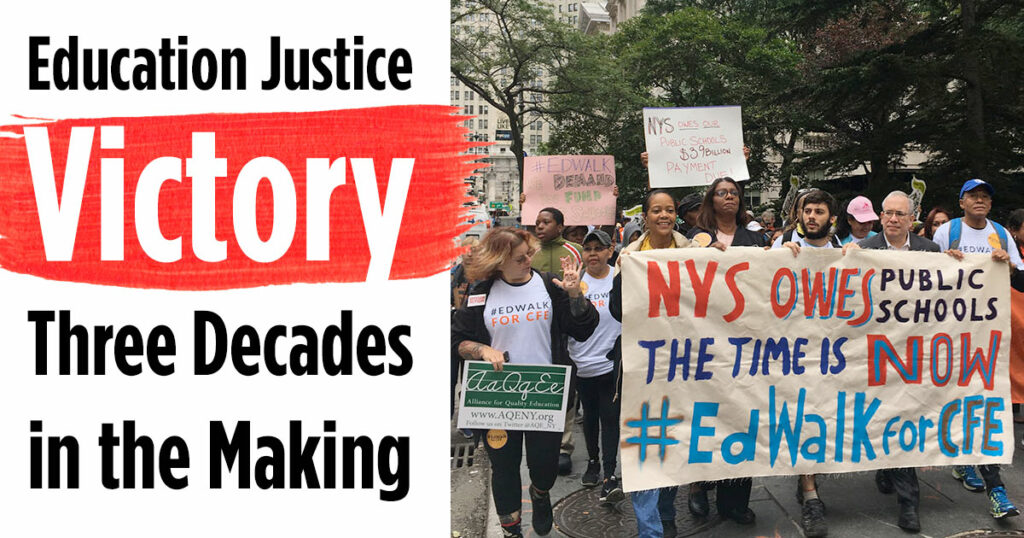Blog
A 30-year Fight for School Funding Equity Ends in a Resounding Victory

The 2021-22 New York State budget meets a thirty-year-old demand and thirteen-year-old broken promise: equitably fund New York State’s public schools so that no matter what zip code a child resides in, there is a baseline of quality their public schools can afford to meet.
The massive, downright Dickensian difference in funding between schools that sometimes are mere blocks from each other has been a hallmark of New York’s public education system for generations. In 2012, a Schott Foundation report on the particularly stark disparities in New York City described it as education redlining: schools with predominantly white children were far better funded — and unsurprisingly, had higher academic outcomes — than schools with predominantly Black and Latinx children. We found a similar disparity with income as well. As the report concluded, “A Black or Hispanic student, or a student of any race or ethnicity from a low-income household, is most likely to be enrolled in one of the city’s poorest performing high schools.”
By 2012 it shouldn’t have been that way. Five years earlier, in 2007, the 13-year Campaign for Fiscal Equity lawsuit concluded in a victory for public schools: New York State agreed, under court mandate, to commit more than $5.5 billion in funding over four years to equitably fund all public schools. 70% of that funding was to go to the lowest-income school districts, whose property tax bases couldn’t compare with those of wealthier cities and neighborhoods. However, this funding, known as Foundation Aid, never fully materialized. Between the 2008 financial crisis and a wave of budget cuts by legislators, what should have been a decade of equity became one of austerity. And as is always the case when state governments tighten their belts, low-income and BIPOC residents bore the brunt of it.
But the Campaign for Fiscal Equity was always more than just a lawsuit: it was at the heart of a renaissance of education justice organizing across the state. The strategic approach advocates took in crafting this campaign back in 1993 is what drew the Schott Foundation — itself having just been founded — to support the fight from its earliest days. While attorneys were making arguments in courthouses, there were parents, students, and educators rallying on the steps outside. Academics and researchers pored through spreadsheets and made records requests to find out just how much schools were being underfunded. Parents and students organized in their schools and neighborhoods to educate and organize their peers. And seasoned advocates were making ever-stronger cases for funding equity to policymakers under the capitol dome in Albany.
Schott’s partner, the Alliance for Quality Education (AQE), founded in 2000 to further the Campaign for Fiscal Equity, has tirelessly organized, lobbied, released dozens of reports, and even launched a database to show how much each school is owed under the settlement. It linked up with groups like Citizen Action of New York, Make the Road New York, New York Communities for Change and the NYC Coalition for Educational Justice to broaden and strengthen the education justice movement.
In the last several years, the hard-fought battles, consistent parent and youth organizing — and two 150-mile marches to Albany! — began to pay off, with notable if insufficient increases in state funding for public schools and Foundation Aid.
Now, by finally making Foundation Aid a guaranteed and permanent part of the New York State budget after a three-year phase in, communities around the state can breathe a bit easier. Until schools actually receive the money they’re owed, advocates will remain vigilant given the state’s history of broken funding promises. And there is still much that needs to be done to bring education justice to New York public schools — from removing police to integrating culturally-responsive curricula. But for now, this is a victory New Yorkers can celebrate and everyone in the country can draw inspiration from.
As AQE Executive Director Jasmine Gripper put it:
“The school aid in this year’s state budget has the potential to change the experiences and opportunities our children have in their public schools for years to come. This has been a long fight, far too long for the tens of thousands of students who were born, educated and grew into adults while waiting for the funding and resources that should never have been denied them. This was always about children and what they need.
“The goal of the Campaign for Fiscal Equity lawsuit and funding the Foundation Aid formula was to give our schools a shot in the arm: an infusion of resources to raise the state’s funding up to the minimum level required for every child to get a ‘sound, basic education.’ Now, we can turn ahead and begin the work to carry educational justice forward.”


